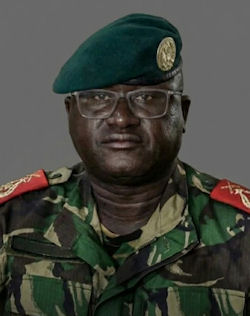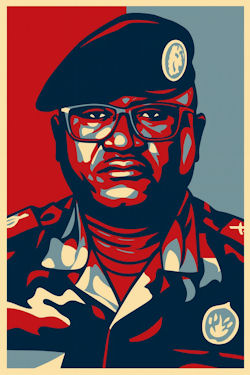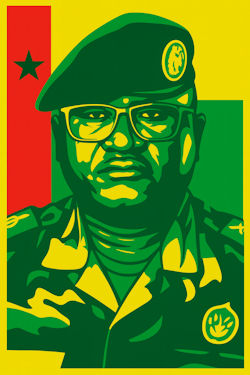Denis N'Canha
 On 26 November 2025, General Denis N'Canha emerged as the public face and leader of the military takeover in Guinea-Bissau. He is identified in reports as the head of the military household at the presidential palace and was the head of the presidential guard, a position tasked with the protection of the president. In a statement read on state television while surrounded by armed soldiers, he announced that the military had taken "total control" of the country.
On 26 November 2025, General Denis N'Canha emerged as the public face and leader of the military takeover in Guinea-Bissau. He is identified in reports as the head of the military household at the presidential palace and was the head of the presidential guard, a position tasked with the protection of the president. In a statement read on state television while surrounded by armed soldiers, he announced that the military had taken "total control" of the country.
The military seized power in Guinea-Bissau after a shootout that lasted about half an hour, according to a statement from the Guinean Armed Forces. The statement was read on Guinean state television TGB by the spokesman for the High Military Command, Dinis N'Tchama, who reported that the military had assumed leadership of the country. The statement informs that "the High Military Command for the restoration of national security and public order has been established by the high military leadership of the different branches of the Armed Forces" and that it "has just assumed the full powers of the State of the Republic of Guinea-Bissau". The High Military Command reported that it has deposed the President of the Republic, Umaro Sissoco Embaló, and that it has closed, “until further notice, all institutions of the Republic of Guinea-Bissau”.
General N'Canha [His name is also sometimes spelled “Dinis Incanha” or “Dinis N’Tchama”.] declared the formation of the "High Military Command for the Restoration of Order," a body composed of all branches of the armed forces that would lead the nation until further notice. He stated that the coup was launched in response to "the discovery of an ongoing plan" orchestrated by politicians and other figures, including a "well-known drug lord," which aimed to destabilize the country by manipulating the results of the presidential election held on 23 November 2025.
The High Military Command will exercise state power from today's date "until the entire situation is properly clarified and the conditions for a full return to constitutional normality are met." The military is appealing for "calm, cooperation from the Guinean people, and understanding from everyone in the face of" what they describe as "a serious situation imposed by a national emergency."
Several senior military officers were arrested on 03 November 2025 on accusations of trying to stage a coup. The army said it had thwarted an “attempt to subvert the constitutional order.” “This sad episode, which involves some general and senior officers of our Armed Forces, jeopardises the peace and stability so desired for socio-economic development and the attraction of foreign investment,” the armed forces General Staff said in a statement. Guinea-Bissau had gone through four coup and 17 coup attempts since 1974.
Following the seizure of power, General N'Canha announced a series of decisive measures on behalf of the new military command. He declared the deposition of President Umaro Sissoco Embaló and ordered the immediate suspension of the entire electoral process, which was awaiting official results. He also announced the closure of all land, air, and sea borders, the suspension of all media programming, and the imposition of an indefinite overnight curfew. In his address, he urged the citizens of Guinea-Bissau to remain calm during the transition.
A significant aspect of this event is General N'Canha's previous role in close proximity to the ousted president. As the head of the presidential guard, he was the official responsible for President Embaló's security. Al Jazeera's reporting highlighted the irony of the situation, noting that "the man supposed to protect the president himself has put the president under arrest". President Embaló confirmed his own arrest and deposition in a phone call to France24.
Denis N’Canha is a senior military officer in Revolutionary Armed Forces of the People (the national armed forces of Guinea-Bissau). In February 2021, he was appointed replacing his predecessor, General António Abel.
The President of Guinea-Bissau, Umaro Sissoco Embaló, dismissed the head of the Military House of the Presidency of the Republic, Brigadier General António Abel, 23 February 2021 and appointed Colonel Dinis Incanha as head of the “Military Office of the Presidency” — in Portuguese, Chefe da Casa Militar da Presidência. At that time, he held the rank of Colonel; subsequently, he was promoted to Brigadier General. This personnel change was announced by presidential decree, published by the Office of Communication of the Presidency of the Republic. In four days, this is the second time the Head of State has moved military personnel, and it comes less than two weeks after he denounced alleged rumors about a possible coup d'état. The new Chief of Staff of the Air Force, Filinto Silva Ferreira, appointed last Friday, his new deputy, Mamadú Saliu Embaló, and the other newly appointed officials wree sworn in on the 24th, at the Presidential Palace.
In the presence of the Chief of the General Staff of the Armed Forces, General Biague Na Ntan, and the Prime Minister, Nuno Nabiam, Umaro Sissoco Embalo swore in the new military chiefs and reiterated his appeal for rigor, discipline, and patriotism from the members of the army. The President swore in the new military chiefs he had appointed in recent days. The swearing-in ceremony was accompanied by the promotion of some of the appointed military chiefs. Dinis Incanha, also a colonel, was promoted to major general to lead the Military House of the Presidency of the Republic.
From this position, N’Canha was closely integrated into the seat of power, serving as the link between the presidency and the military apparatus. His role presumably gave him oversight and influence over the security of the presidency — a sensitive, high-stakes function in a country long plagued by instability.
Detailed personal information about General Denis N'Canha — such as his full biography, career history, and background — remained largely unavailable in public reports. Much remained unclear: there was no publicly available detailed biography of N’Canha — his age, place of birth, early career, education, family background — are not widely documented. The exact composition of the new military command, its roadmap (if any) to restore civilian government, and how other power centers (civil society, opposition groups, international actors) will react are all uncertain.
The ascent of Denis N’Canha to the helm of power in Guinea-Bissau is deeply consequential. First, it underscores the fragile relationship between civilian politics and the military in a country that has experienced repeated coups since independence from Portugal in 1974. Second, N’Canha’s takeover — only days after contested elections and amidst claims, counterclaims, and alleged plots — threatens to entrench a new period of military rule. The suspension of institutions, freeze on media and elections, and imposition of curfews could mark a regression in democratic governance, civil liberties, and rule-of-law norms.
Third, the method and timing of the coup may fuel deeper instability. Because neither opposition groups nor foreign governments have recognized the legitimacy of the takeover yet, there is a risk of internal unrest, external pressure, or fractured governance — especially in a country where the army has historically played a decisive role in politics. Finally, with N’Canha now positioned as the de facto leader of Guinea-Bissau, the future of the country will depend heavily on the choices he and the new military command make — whether to restore civilian rule, negotiate with opposition forces, hold credible elections, or entrench military governance. The ripple effects — domestically and regionally — could be significant.


Scenario 1 — Consolidation of Military Rule
The most likely short-term trajectory (0–24 months). In this scenario, N’Canha and the High Military Command decide that the “restoration of order” mandate is open-ended. The suspension of political institutions, media, borders, and the electoral process becomes the new normal. Though the military initially frames the takeover as a corrective action against alleged electoral manipulation and national instability, it gradually settles into a pattern of governing through decrees, bypassing all civilian checks and balances.
Over time, the junta reorganizes the security structures around N’Canha personally. Key loyal commanders are promoted, dissenting officers quietly purged, and new internal intelligence units are created under the justification of national security. The curfew might be relaxed, but only symbolically, while real political power remains firmly in military hands.
International reactions — condemnations, sanctions threats, suspension from regional bodies like ECOWAS — create diplomatic pressure, but not enough to force an immediate reversal. Instead, Guinea-Bissau drifts toward the model seen in Mali and Burkina Faso: the junta adopts a defensive posture, presenting itself as the only actor capable of stabilizing the nation in the face of foreign interference, political corruption, and organized crime.
Under this pathway, N’Canha gradually evolves from a transitional military figure into a long-term strongman, centralizing authority in a system that increasingly resembles military-bureaucratic autocracy.
Scenario 2 — Negotiated Transition With Civilians
Moderately likely, but dependent on internal and external pressure - In this scenario, the junta discovers that it cannot govern the country indefinitely without paying an economic and political price. International isolation begins to bite: frozen aid flows, suspended development programs, travel restrictions on senior officers, and growing tension with neighboring Senegal and Guinea create a strategic dilemma. Domestically, civil society groups — lawyers’ associations, clergy networks, student organizations, women’s cooperatives — begin to push for clarity on a road map back to constitutional order.
Under increasing pressure, N’Canha opts for a controlled, negotiated transition. He announces a timetable for constitutional reform, the reopening of political space, and eventual multiparty elections. A transitional charter is drafted. Civilian technocrats may be invited to join an interim cabinet, though the military retains final authority.
This kind of transition is rarely linear: there may be pauses, reversals, and attempts by the junta to influence the rules of the game. But the key difference from Scenario 1 is that the military accepts the principle — and in time, the reality — of stepping back. Such a transition typically takes between 18 months and 3 years, depending on internal stability and the ability of civilian groups to negotiate in a unified way. The end result: Guinea-Bissau returns to a constitutional government, but with the armed forces still holding informal power behind the scenes.
Scenario 3 — Internal Fracture and Instability
Less likely immediately, but possible if the coalition behind N’Canha splinters = This scenario is more dangerous and unpredictable. Guinea-Bissau’s military has long been factionalized, with competing networks tied to political patrons, business interests, ethnic loyalties, and, historically, to elements of the transatlantic drug trade. If N’Canha is unable to balance these factions — or if his crackdown on political and media institutions alienates key officers — the junta could fracture from within.
A rival commander might challenge the High Military Command’s legitimacy, or sympathetic units could attempt a counter-coup claiming that N’Canha exceeded his mandate. Civilian protests, if they grow large enough, could trigger repression that further weakens military cohesion. External actors might also play a role: neighboring governments, regional blocs, or even illicit networks could take sides in a struggle for influence.
In this scenario, the country enters a period of stop-start instability, with repeated attempted coups, contested authority, and a weakened state apparatus. N’Canha may remain a dominant figure, but his control becomes tenuous, and the security situation deteriorates. This is the scenario with the highest risk to civilians and the lowest probability of orderly governance.
|
NEWSLETTER
|
| Join the GlobalSecurity.org mailing list |
|
|
|

